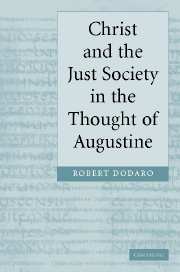Book contents
- Frontmatter
- Contents
- Acknowledgements
- List of abbreviations
- Introduction
- 1 Eloquence and virtue in Cicero's statesman
- 2 Justice and the limits of the soul
- 3 Christ and the formation of the just society
- 4 Divine eloquence and virtue in the scriptures
- 5 Wisdom's hidden reasons
- 6 Eloquence and virtue in Augustine's statesman
- General conclusion
- Select bibliography
- Index of references to Augustine's works
- Index of persons and subjects
3 - Christ and the formation of the just society
Published online by Cambridge University Press: 22 September 2009
- Frontmatter
- Contents
- Acknowledgements
- List of abbreviations
- Introduction
- 1 Eloquence and virtue in Cicero's statesman
- 2 Justice and the limits of the soul
- 3 Christ and the formation of the just society
- 4 Divine eloquence and virtue in the scriptures
- 5 Wisdom's hidden reasons
- 6 Eloquence and virtue in Augustine's statesman
- General conclusion
- Select bibliography
- Index of references to Augustine's works
- Index of persons and subjects
Summary
Augustine's decision to establish the just society in Christ is fundamental to his way of thinking. Being, unity, truth, goodness, and beauty inevitably conduct the soul to God and, therefore, to Christ as the way to God. The same logic obtains for justice. Augustine maintains that justice cannot be known except in Christ, and that, as founder (conditor) and ruler (rector), Christ forms the just society in himself. United with Christ, members of his body constitute the whole, just Christ (Christus totus iustus), which is the city of God, the true commonwealth, and the locus for the revelation of justice. It will be argued in this chapter that, in Augustine's view, Christ creates this just society through his mediation of divine humility to human beings through his incarnation. Christ's virtue takes hold in human beings when they believe in the mystery of the incarnate God. In this chapter we shall also see that, for Augustine, this faith in the incarnation requires believers (1) to reject the concept of an autonomous moral reason in the soul, (2) to affirm that the source of their virtue is Christ, and (3) to accept that perfect human virtue can be found only in Christ.
Before moving deeper into this discussion, we should keep in mind two general points in Augustine's thought regarding Christ's role in revealing justice, the first concerning Christ's person and work, the second concerning the nature of justice. Regarding Christ, Augustine makes a series of interrelated claims.
- Type
- Chapter
- Information
- Christ and the Just Society in the Thought of Augustine , pp. 72 - 114Publisher: Cambridge University PressPrint publication year: 2004
- 1
- Cited by



